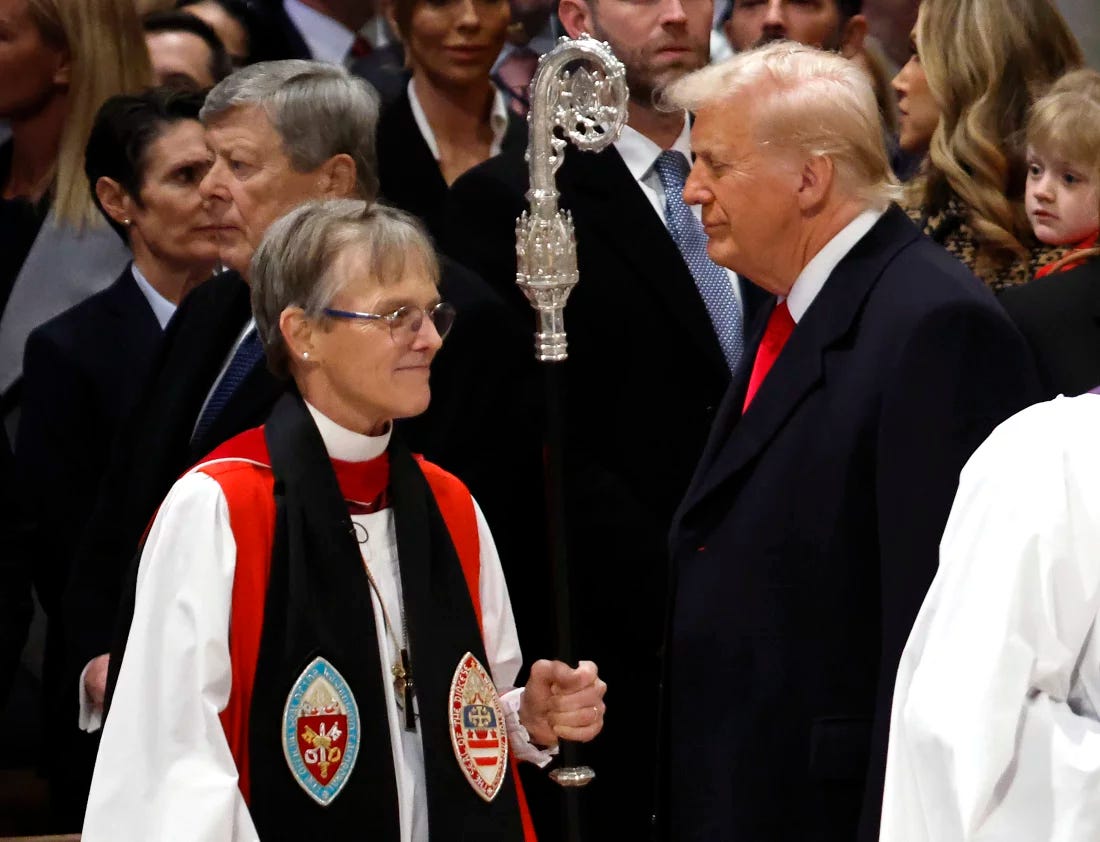In my seven years in the pulpit, my words got me in trouble a few different times. There have been the congregants who didn’t like it when I brought “politics” into my sermons although politics is usually a moral or ethical claim that doesn’t align with their political ideology. There was the time I got reprimanded for expressing disappointment about an alleged cover up claim toward a fellow Rabbi. And who could forget the sermon that was transcribed word for word by a congregant, given back to me with copious notes, and had my title put in quotes, “rabbi”?
Who do clergy speak to when they speak? Themselves? Their congregants? A specific audience member? I got to thinking about that as I heard two different clergy people offer two different types of speeches this week related to the inauguration. The first was from Rabbi Ari Berman, President of Yeshiva University
The second one was from Bishop Budde of Washington D.C. who offered the following at the National Prayer Service:
I don’t personally know Rabbi Berman although I have heard many a lovely thing about him and I certainly don’t know Bishop Budde but their offerings got me thinking. What’s the point of a speech like this? I don’t mean that glibly. In the deepest sense, who does it serve?
I don’t take issue with Rabbi Berman’s words despite them being fairly anodyne. Beseeching the President to act with morality and righteousness is prayer-worthy although this particular man doesn’t seem to hold those too high on his priority list, so again, I wondered, who is he speaking to?
Perhaps he believes that there are better angels in the room, members of the cabinet, unseen power brokers, or the rest of the country for whom this prayer would feel resonant. But the current President seems more likely to have fallen in the camp of those that derided the Prophet Jeremiah than listened to him, so Rabbi Berman’s words, although appreciated, left me feeling a little underwhelmed.
How do you speak to a moment like this?
Then, I heard Bishop Budde’s words which came at the end of a longer oration speaking to the theme of unity not being a partisan issue. To stand in that room, in front of those people, and offer those words took immense courage. Still I wondered, what’s the point? Do we really think that this Episcopal Bishop asking the President to have mercy will really make an impact? My cynical side said no but something inside me felt activated by her words.
It brought to mind a powerful teaching from this week’s Torah portion, Va’era. Moses and Aaron are tasked with speaking to the Israelites to let them know they are being freed and to speak to Pharaoh to demand their release. The former are unable to hear Moses because they are described as being short of spirit and burdened by cruel labor.
In 6:13, The Torah says:
וַיְדַבֵּ֣ר יְהֹוָה֮ אֶל־מֹשֶׁ֣ה וְאֶֽל־אַהֲרֹן֒ וַיְצַוֵּם֙ אֶל־בְּנֵ֣י יִשְׂרָאֵ֔ל וְאֶל־פַּרְעֹ֖ה מֶ֣לֶךְ מִצְרָ֑יִם לְהוֹצִ֥יא אֶת־בְּנֵֽי־יִשְׂרָאֵ֖ל מֵאֶ֥רֶץ מִצְרָֽיִם׃ {ס}
So יהוה spoke to both Moses and Aaron in regard to the Israelites and Pharaoh king of Egypt, instructing them to deliver the Israelites from the land of Egypt.
Reading that verse closely, the Kedushat Levi, Rabbi Levi Yitzchak of Berdichev wonders why both Moses and Aaron are charged with speaking to both the Israelites and Pharoah. In other words, why two audiences from two speakers?
Both Aaron and Moses were intent on convincing the people that the all-powerful and totally self sufficient God nonetheless enjoys the prayers of the Jewish people and responds to their service positively. They were to explain that it was these prayers that opened the gates of God’s treasure chambers.
Sure they were speaking to Pharoah and to the Israelites, but it was really the latter that was the target audience because they were the ones so burdened by their current situation. They needed the reminder that even at their lowliest, they were still desired and protected.
This teaching rose in my head this week as I thought about these two speeches and the role of the preacher in politics at all. It helped me understand what I think the role can be and why I found Bishop Budde’s words more resonant than Rabbi Berman’s.
Speaking in a setting like this is not just for the audience right in front of you. It’s for the person suffering under the cruelness of having their spirit crushed through arduous labor. Will the President be affected by Bishop Budde’s words? Unless you count a temper tantrum thrown on Truth Social, then no. But perhaps there are people out there who think no one is fighting for them who hear her talking to a group of powerful people and realize that they aren’t alone.
That, in my humble opinion, is who clergy folk are talking to. It is fitting to think about in the week when we mark Dr. King’s legacy as well. As Daniel Stid wrote this week:
It is comforting to see Dr. King only as the aspirational dreamer of a color-blind society, a vision especially reassuring to white Americans, and leave things at that. But there was a prophetic radicalness to King’s statesmanship, and a telling critique of the American political tradition, that we also must reckon with, learn from, and respond to.
Rabbi Berman aspired, which has its place but Bishop Budde spoke to something deeper and more real. It set a high bar that I hope that I, along with my colleagues can continued to reach during these turbulent times. There’s a real sense of nihilism around these days, something that I feel myself; yet we can’t simply rest on aspiration. I hope that these words can remind us of the reckoning that is required, no matter the blowback.
Sending wishes for a peaceful and quiet weekend ahead.
Shabbat Shalom!




https://www.rawstory.com/trump-pepfar/?utm_campaign=trueanthem&utm_medium=social&utm_source=facebook&fbclid=IwZXh0bgNhZW0CMTEAAR15kJnLC9rFsrI5AXeYIehgv1FG7kOeKWMeHodUxUvqooDAu1X4nVtGiEo_aem_WOOutW0sUjrQDyyCLkb2_Q
100%
Afflict the comfortable and comfort the afflicted, give them hope.